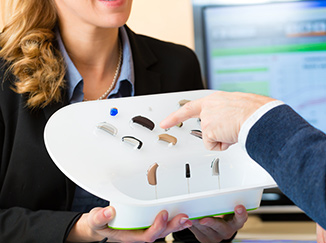Do you want fries with that?
This is where things can get a bit blurry. Your HHP may be suggesting a hearing aid that you can’t afford or you’re not sure if you need all the added ‘extras’. Or your HHP may have a deeper understanding of the problems you’re experiencing and wants to ensure all your communications issues are met.
If you’re unsure about anything the clinician is discussing with you, you can go away and think about the results and recommendations. Talk about it with your family, or get a second opinion. If you feel uneasy or unsure, it’s important to take this step.

Upselling
If you are eligible for the Australian Government Hearing Services Program you’ll find that you are eligible for free hearing aids. These hearing aids are good, but usually at a lower technology level and you may find your HHP encourages you to go for a higher level of technology or a ‘top up’. If you do this, you’ll be required to cover the cost between the lower level technology and the higher suggested level. Your hearing levels may require this technology, or they may not. Be very clear on your needs and what you can afford.
Don’t be forced into buying something you don’t want, understand or can cover the cost of. It’s a good idea to have a family member with you to ensure you aren’t being forced into something not required. Check the trial period so if you do go with the higher technology, you know how long you’ve got to try all the technological features and if they are useful for you. Check how much you’ll be refunded if you decide the higher level technology is not for you.

If you aren’t eligible for the Government hearing aid program, you will still need to be wary of upselling. Again be clear on what you can afford and what your communication needs are. Listen to what your HHP says, but don’t be forced in to a higher level of technology if you don’t think it will suit your needs or your purse.
If a higher level of technology is suggested, ask the clinician why they think you need this. They should be able to discuss the technology of the hearing aid and any relevant research to back up their decision, demonstrating why it’s right for you. If they can’t, perhaps it’s time to get a second opinion.

Commissions
In some clinics, HHPs do get offered sales commissions for selling and upselling hearing aids. You can ask your Audiologist or Audiometrist what incentives they receive for the hearing aids they sell. They may not want to divulge this information. However, an ethical clinician will be happy to discuss this with you. You may also want to ask why a particular brand is being suggested.
It’s not unusual for some practices to have a preferred hearing aid manufacturer, but some Hearing Clinics are owned by hearing aid companies and so the choice of hearing aids is limited to that brand. The clinician may also be offered commissions for selling more of one type of brand than another. If you have a good understanding of what hearing aid brands are available, you can ask why you have been offered that particular hearing aid and not a different brand.
You want to make sure you get the best hearing aid for your particular needs – and it may not necessarily be the brand of hearing aid you’re being offered.

Added extras – will they cost more?
Generally, yes. If your clinician has suggested a higher technology level, an accessory to the hearing aid, (such as a TV streamer or a remote microphone), or a hearing aid that has a rechargeable battery, they will all cost more. A hearing aid dry kit or ‘dehumidifier’ usually comes at an extra cost. Smartphone apps, on the other hand, are free to download. Things like batteries, cleaning equipment and wax filters are included in the initial cost of the hearing aids. However once you run out of these, you will need to purchase more.
Once again, if your HHP suggests any ‘added extras’ to your hearing aid, check with them if they come at a cost. Be very clear on what you’re paying for and if you can return it, if it doesn’t work as expected or meet your needs.
